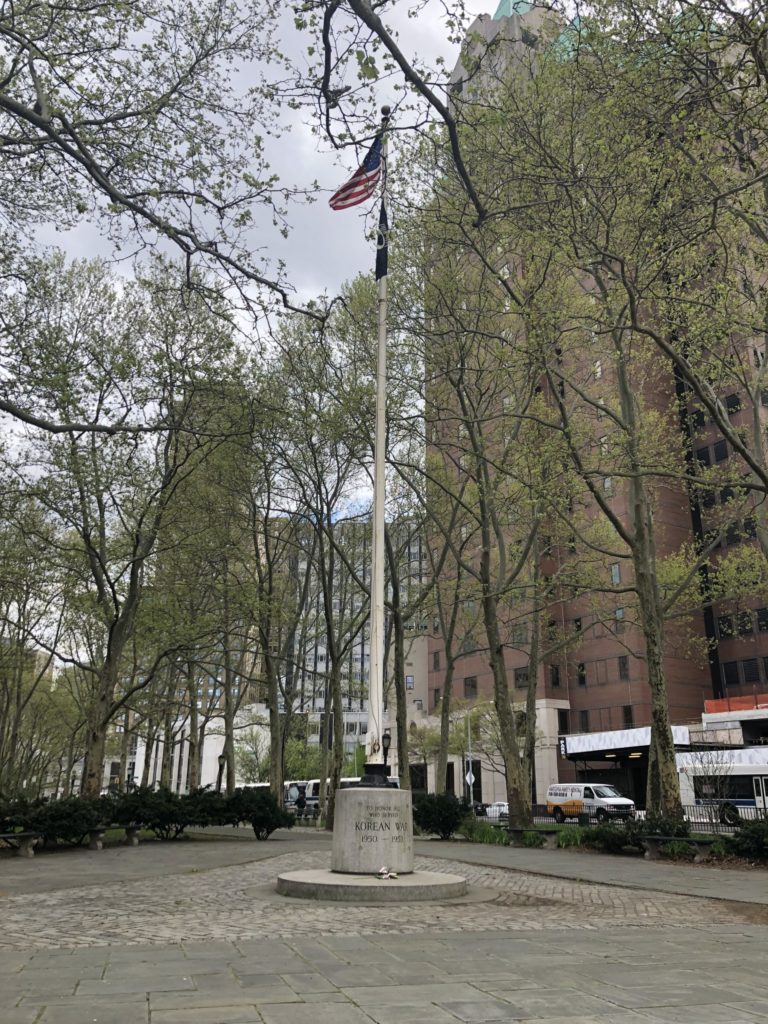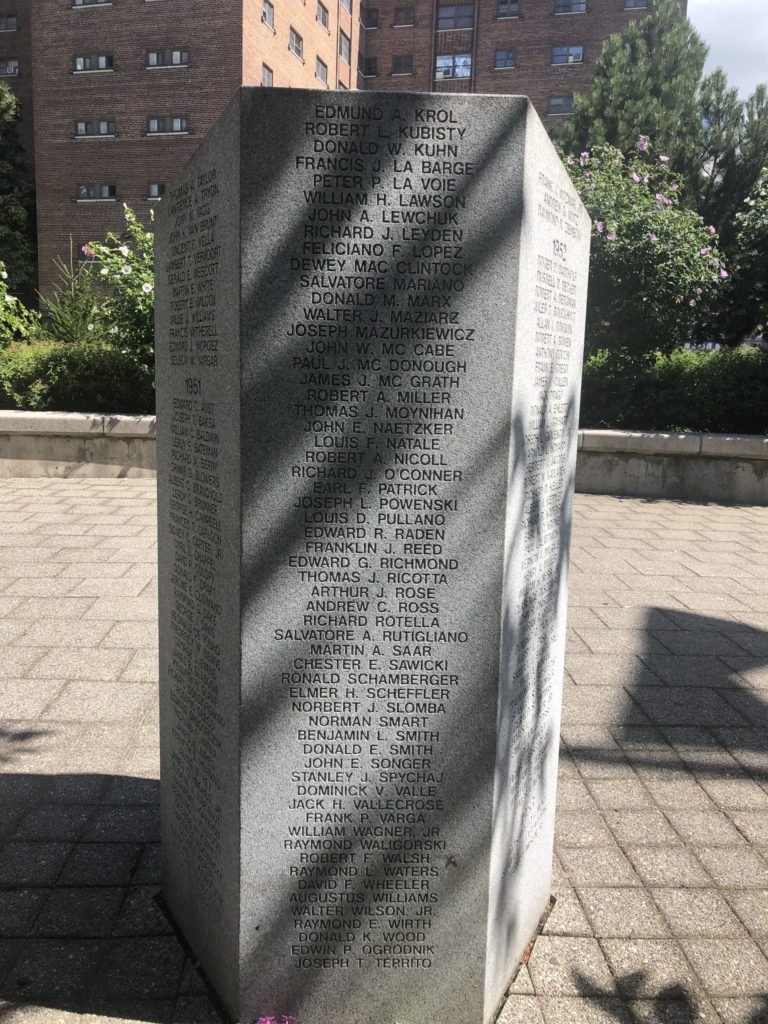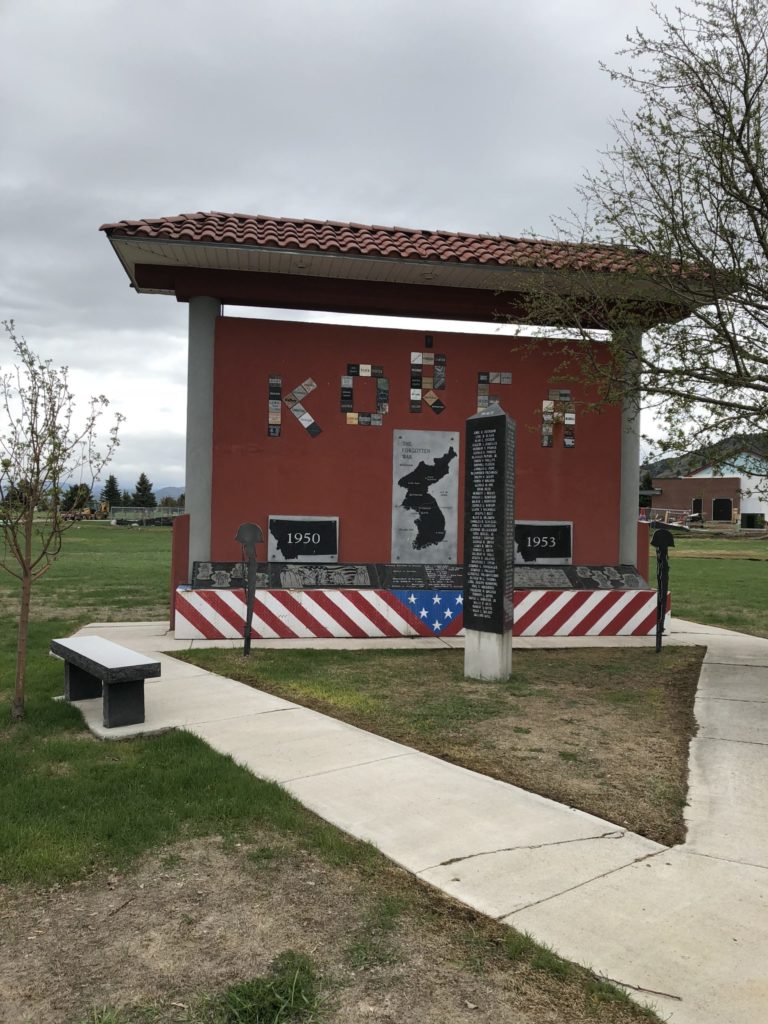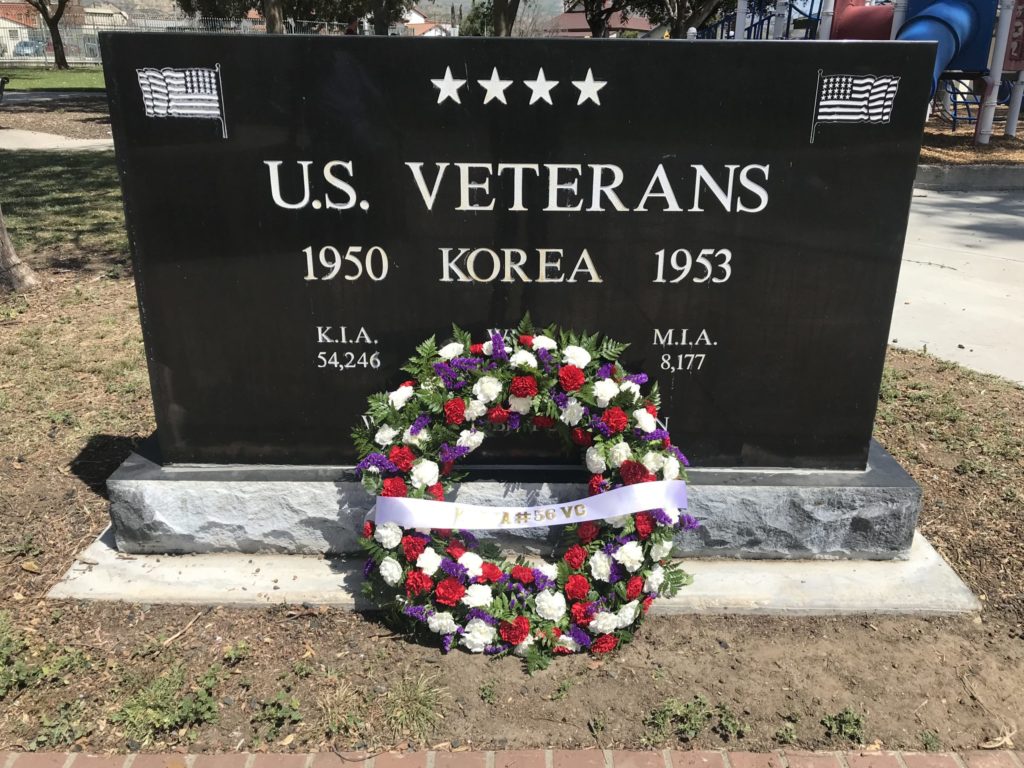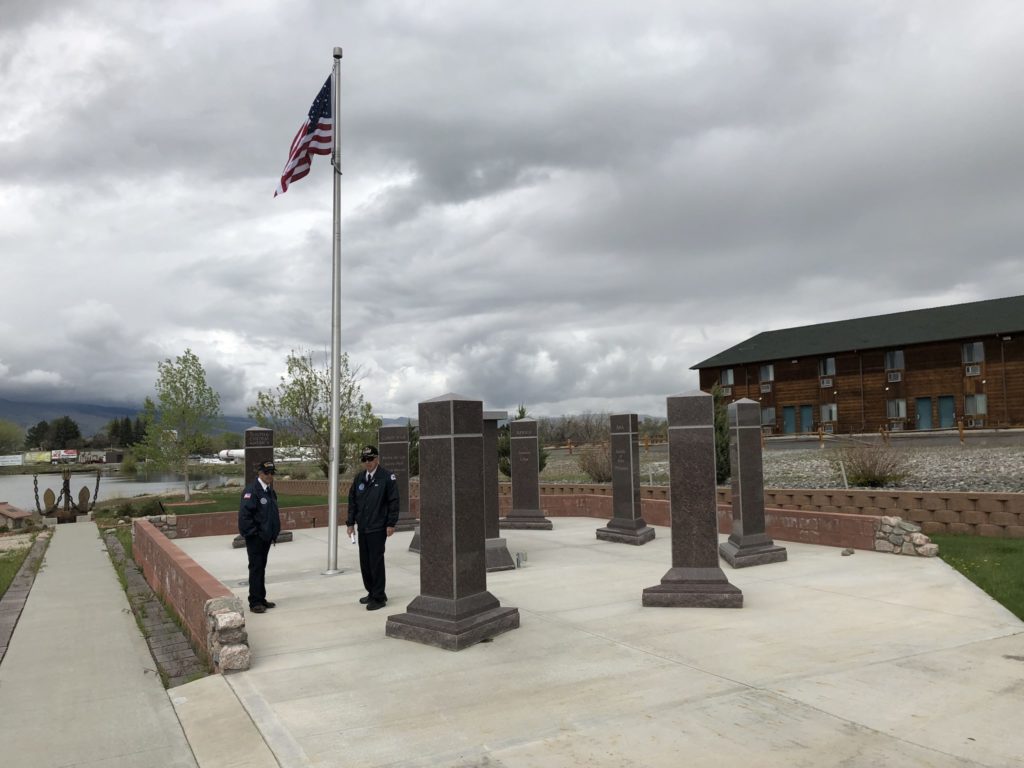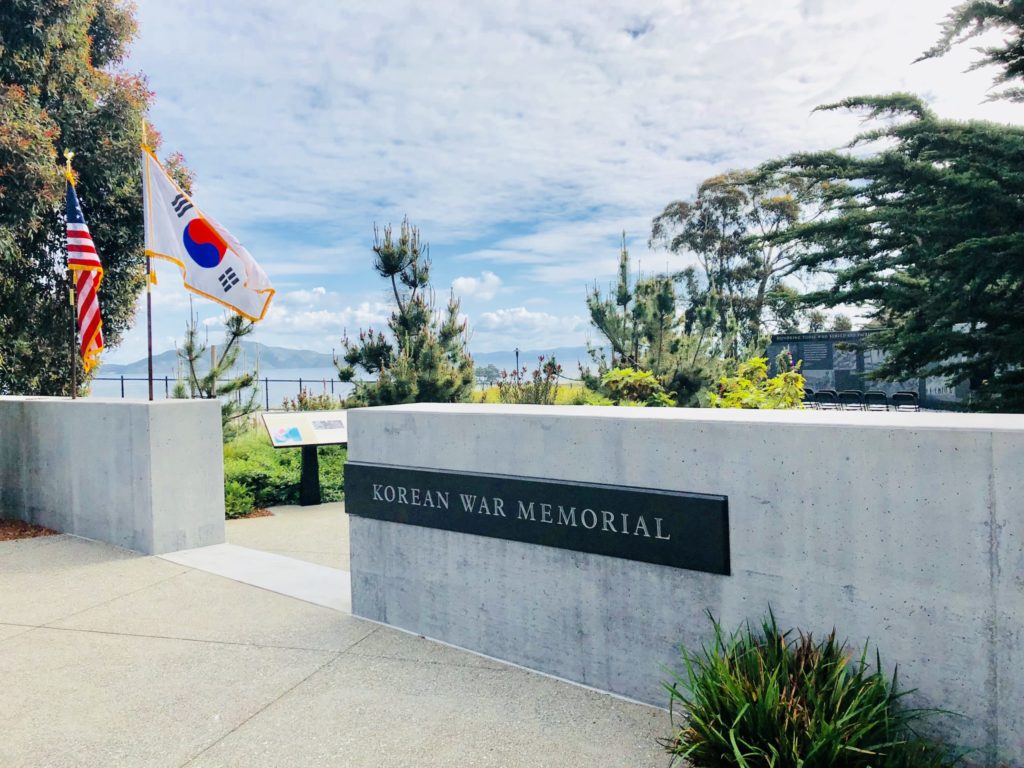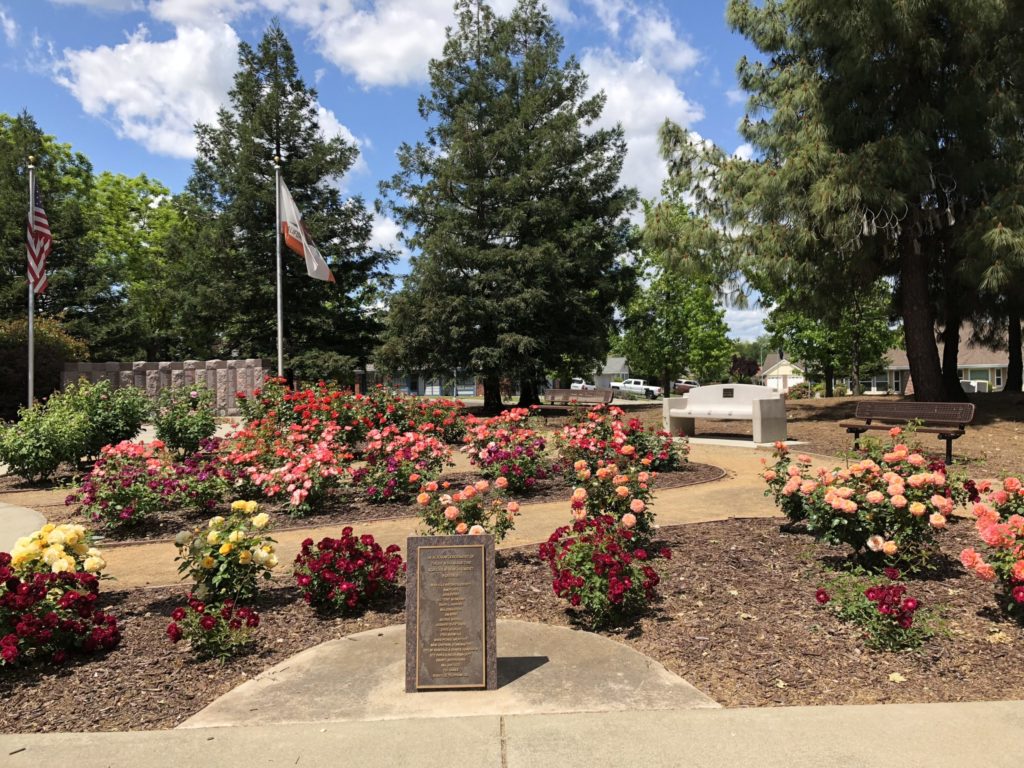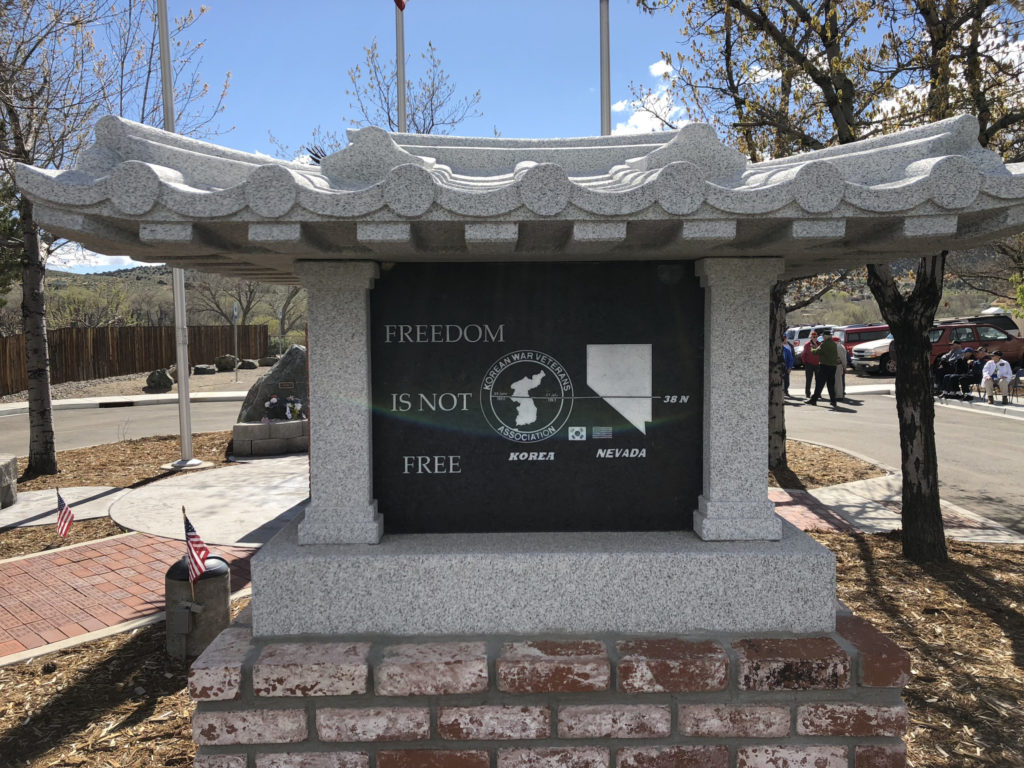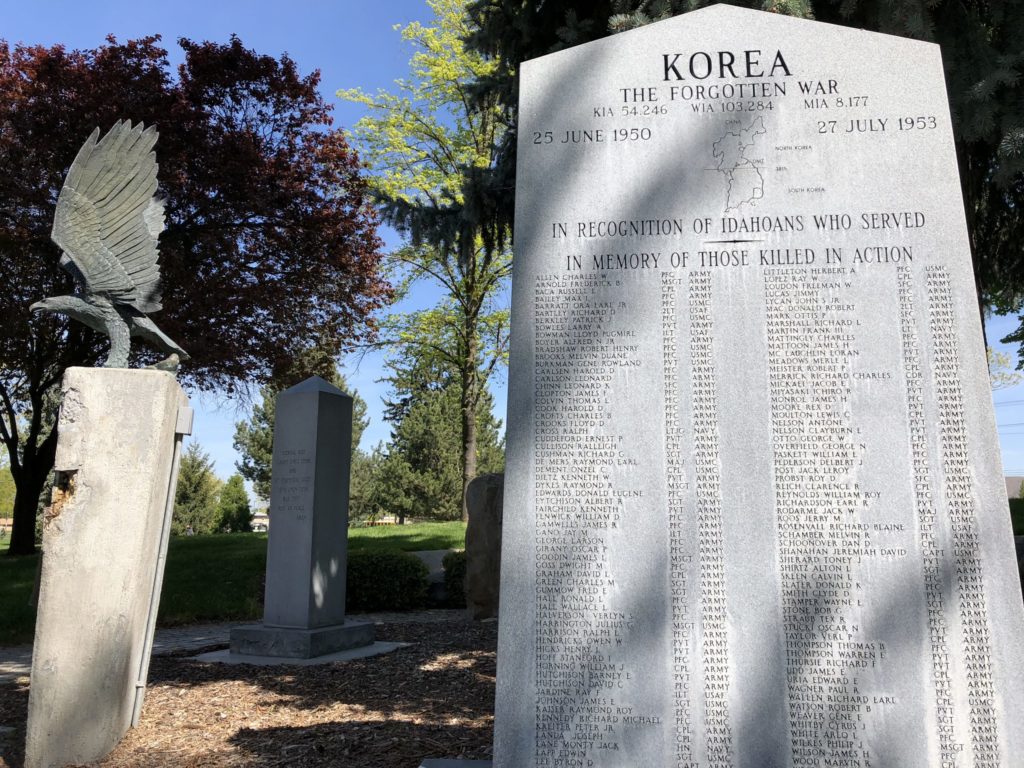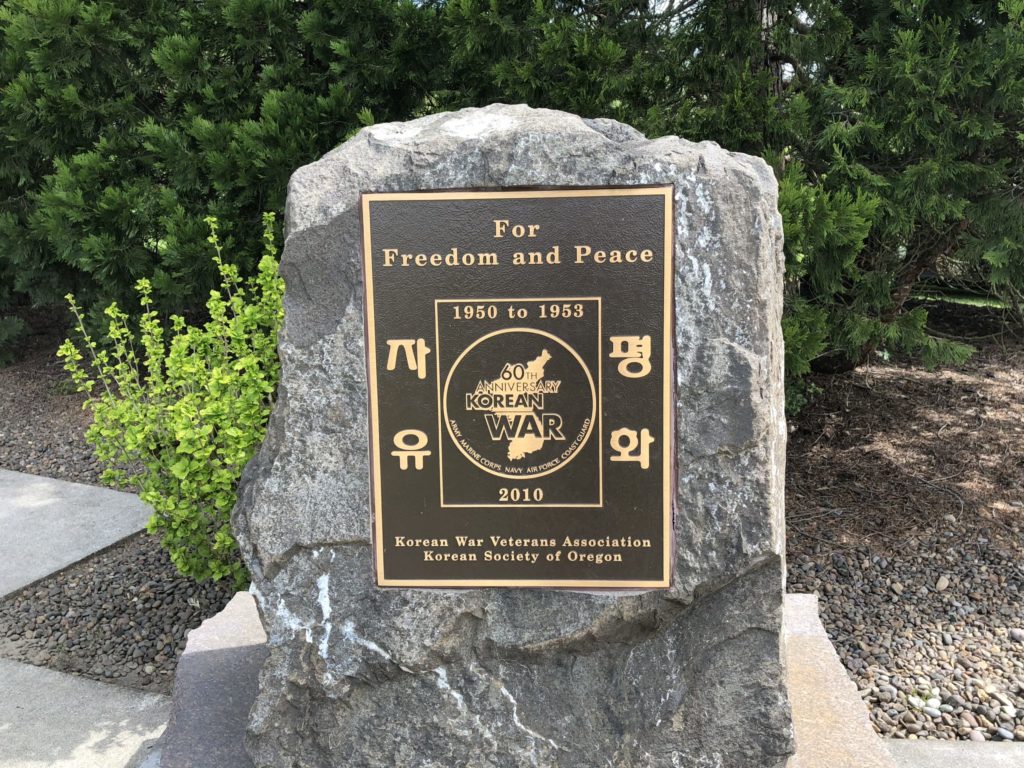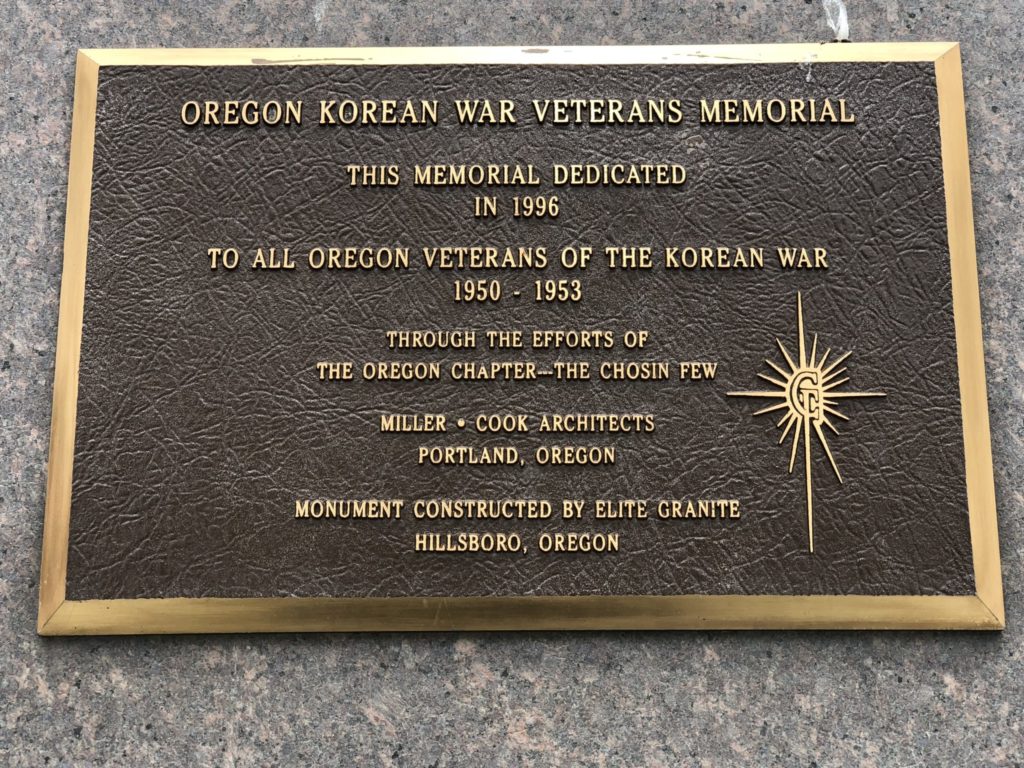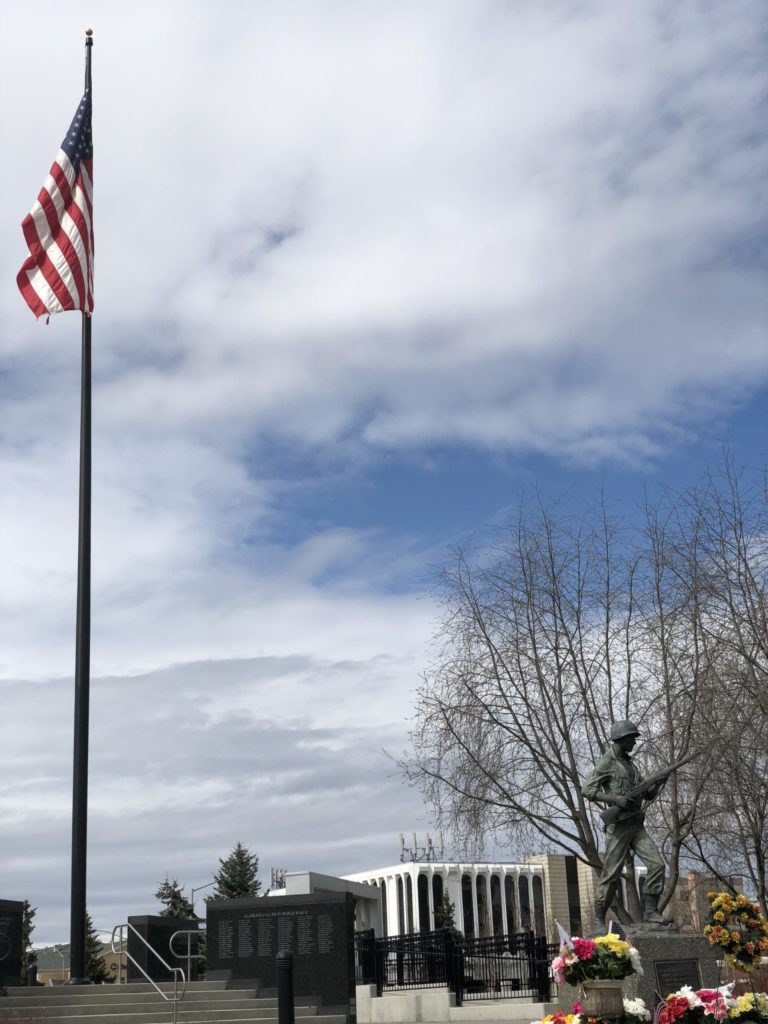Featured Memorials
Featured Stories
-Estas placas fueron instaladas el, el 14 de Noviembre del 2000, del año 2007, ante una ceremonia muy hermosa con todos los destacamentos militares, la asistencia del comandante del Ejército, el Estado Mayor, la Armada Nacional, y mucho público y todos los veteranos de la guerra de Corea. Fue algo, fue muy conmovedor para la ciudadanía de Bogotá y para todos los militares y veteranos que asistimos, puesto que no se había colocado en ninguna parte de Colombia por parte del Gobierno ninguna conmemoración, ningún recuerdo a los muertos de la guerra. Estábamos buscando y yo me dediqué a buscar con ellos. Y un buen día, tuve la inspiración de venir aquí y proponerle al padre párroco que, que si me daba permiso de colocar las placas acá en este lugar tan sagrado para la, donde están los mártires de la patria. E inmediatamente me aceptó. El general Álvaro Valencia Tovar, que en paz descanse, puso todo el empeño por su experiencia militar. Fue comandante del Ejército, estuvo en la guerra de Corea, fue el comandante de la primera acción contra los chinos. Y me dijo: “Isaac, cuente con mi apoyo porque esa idea no se me había presentado a mí, no se me había ocurrido a mí. Yo lo apoyo”. Y cuando me di cuenta, pues, comunicó al Estado Mayor, convocó a todas las fuerzas militares, y fue algo esplendoroso. Que, por eso esas placas están aquí. Yo puse mi aporte espiritual y no más. Que Dios tenga sus almas en su, su, su reino. Gracias.
– Me llamo José Vidal Beltrán Molano. Mi grado en el Ejército: cabo primero. Formo parte de la Junta Directiva de ASCOE por el cargo de vocal. Quiero hacer un recuento de mi vida antes de ir a Corea. Trabajaba aquí, en este palacio, palacio presidencial, trabajé cinco años. Aquí estaba trabajando antes de ir a Corea voluntariamente a luchar por la democracia y la libertad de Corea del Sur. Me siento orgulloso de haber pertenecido a ese ejército libertador en su país, a ese grupo que fuimos a luchar por la libertad, por la democracia de Corea, de un pueblo oprimido en aquella ocasión. Yo permanecí 15 meses en Corea. Mi comandante fue, con mi, en esa época, coronel Ruiz Novoa, quien falleció en días pasados, hoy general de la República. Mi experiencia allí en Corea fue bastante difícil porque, por el idioma, por las costumbres. Para mí era un país desconocido, gente desconocida, pero gente amable, gente muy querida por la cual luchamos hasta donde fue posible. De mi regreso a Colombia tengo la experiencia de haber sido recibido aquí, en mi país, con honores. Después, formé una familia. Tengo ocho hijos, todos profesionales, un militar, el menor de mi familia, de mis hijos, coronel de la Fuerza Aérea Colombiana. Hemos recibido en la Embajada de Corea, he recibido muchas atenciones, muchos agasajos, beneficios para mis, para mis nietos en cuanto a educación. Y he encontrado mucho apoyo en todos los casos en los cuales hemos tenido que ver mucho con la colonia de Corea. Cualquier pregunta que quiera hacerme, con mucho gusto.
– ¿Qué piensa de que, de Corea y coreanos y el futuro de Corea? Porque la guerra no termina.
– No la, no la escucho, no la entiendo.
– ¿Visitas, visita a Corea?
– Ah, sí, hace dos años estuve por una invitación del presidente de Corea, estuve visitando Corea después de 60 años de haber estado allá en la guerra. Fui muy bien atendido, muy bien recibido. Nos recibieron, fui en compañía de cuatro compañeros más. Fuimos recibidos como héroes. Nos atendieron muy bien. Corea, especialmente Seúl, ha cambiado muchísimo de la época en que estuvimos en la guerra a como se encuentra ahora. Corea se ha desarrollado muchísimo, ha progresado, y me alegra muchísimo que Corea en este momento sea uno de las potencias económicas del mundo, y que su gente maravillosa todavía nos recuerda después de más de 60 años, nos recuerda con cariño y con gratitud. Y todavía en esta fecha nos están dando las gracias por el sacrificio que hicimos por el pueblo de Corea del Sur.
– Me llamo José Vidal Beltrán Molano. Mi grado en el Ejército: cabo primero. Formo parte de la Junta Directiva de ASCOE por el cargo de vocal. Quiero hacer un recuento de mi vida antes de ir a Corea. Trabajaba aquí, en este palacio, palacio presidencial, trabajé cinco años. Aquí estaba trabajando antes de ir a Corea voluntariamente a luchar por la democracia y la libertad de Corea del Sur. Me siento orgulloso de haber pertenecido a ese ejército libertador en su país, a ese grupo que fuimos a luchar por la libertad, por la democracia de Corea, de un pueblo oprimido en aquella ocasión. Yo permanecí 15 meses en Corea. Mi comandante fue, con mi, en esa época, coronel Ruiz Novoa, quien falleció en días pasados, hoy general de la República. Mi experiencia allí en Corea fue bastante difícil porque, por el idioma, por las costumbres. Para mí era un país desconocido, gente desconocida, pero gente amable, gente muy querida por la cual luchamos hasta donde fue posible. De mi regreso a Colombia tengo la experiencia de haber sido recibido aquí, en mi país, con honores. Después, formé una familia. Tengo ocho hijos, todos profesionales, un militar, el menor de mi familia, de mis hijos, coronel de la Fuerza Aérea Colombiana. Hemos recibido en la Embajada de Corea, he recibido muchas atenciones, muchos agasajos, beneficios para mis, para mis nietos en cuanto a educación. Y he encontrado mucho apoyo en todos los casos en los cuales hemos tenido que ver mucho con la colonia de Corea. Cualquier pregunta que quiera hacerme, con mucho gusto.
– ¿Qué piensa de que, de Corea y coreanos y el futuro de Corea? Porque la guerra no termina.
– No la, no la escucho, no la entiendo.
– ¿Visitas, visita a Corea?
– Ah, sí, hace dos años estuve por una invitación del presidente de Corea, estuve visitando Corea después de 60 años de haber estado allá en la guerra. Fui muy bien atendido, muy bien recibido. Nos recibieron, fui en compañía de cuatro compañeros más. Fuimos recibidos como héroes. Nos atendieron muy bien. Corea, especialmente Seúl, ha cambiado muchísimo de la época en que estuvimos en la guerra a como se encuentra ahora. Corea se ha desarrollado muchísimo, ha progresado, y me alegra muchísimo que Corea en este momento sea uno de las potencias económicas del mundo, y que su gente maravillosa todavía nos recuerda después de más de 60 años, nos recuerda con cariño y con gratitud. Y todavía en esta fecha nos están dando las gracias por el sacrificio que hicimos por el pueblo de Corea del Sur.
– Mi nombre es Roberto Fajardo Tupica. Soy de Bogotá. Tengo en este momento 84 años. Viajé a Corea en el año de 1952, a la edad de 19 años. Llegué exactamente el día 18 de enero de 1953 cuando cumplí 20 años. Mi experiencia en Corea voy a referírsela, pero primero le digo que me presenté voluntario a, al Batallón Colombia porque desde muy joven he detestado el comunismo. Y hasta esta, en este momento, también. No estoy de acuerdo con los postulados de, del, del comunismo. En Corea pertenecí al Batallón, al Batallón de la pesada, digamos así, que, que son ametralladoras, cañones y mortero, mortero 81. Yo fui comandante de pieza de mortero 81. Estuve en, en el mayor confrontamiento que hubo que fue en el Old Baldy. Allí estuvimos recibiendo la artillería enemiga durante muchas horas, a consecuencia del cual quedé tres días sordo porque yo era el apuntador y recibía el impacto del, del, del disparo cerca de mis oídos. Eso me, me significó que me hubieran concedido Medalla de Honor al Deber Cumplido. Mi experiencia en Corea fue muy grata por muchos motivos. El primero, porque me encontré con un gran amigo con el que jugábamos fútbol aquí en Bogotá y se me había perdido, el señor Ernesto Segura Vaquero. Nos encontramos, nos reencontramos allá. Eso me valió jugar fútbol, tener ciertas ventajas en, en el tratamiento que nos daban, lo mismo que por jugar ajedrez. Entonces compartía con los oficiales porque les gustaba ese, ese aspecto mío. Allá también tuve, conseguí dos muy buenos amigos, el señor Pedro Vergara y Orlando Bernal con quien también jugábamos fútbol. El señor Vergara fue el que me consiguió el puesto en la contraloría con el general Alberto Ruiz Novoa. A consecuencia de eso, logré encauzar mi vida durante 11 años en la Contraloría General de la República y 20 años en la Compañía Colombiana de Seguros, de donde soy pensionado. En este momento sigo pensando que el comunismo es de lo, de lo peor que nos ha podido suceder. No sé qué, qué más contarles al respecto, pero esa es mi experiencia en Corea. Aquí en Bogotá, después, me casé joven a los 24 años. Tengo seis hijos, todos profesionales, afortunadamente, muy bien situados y mi familia está muy unida. Mis nietas, tengo 10 nietos, siete mujeres, tres hombres. Y ahí vamos en esta vida agradeciéndole, eso sí, a Corea, a la Samsung, a la Embajada, que nos ha colaborado. Yo tuve una hija becada para el bachillerato, una hija no, una nieta becada para el bachillerato que ya culminó sus estudios. Es abogada de la Universidad del Rosario, está muy bien situada. Y esa es mi experiencia con, con Corea.
– Me llamo José Adonai Castilla. Viajé a Corea en el año, año 1952. Tengo 83 años en la actualidad. Regresamos en el año 53 en el mes de septiembre. Para mí como experiencia al viaje, la ida, viaje o ida a Corea fue una experiencia, como joven, muy bonita. Nunca habíamos, en mi caso, ni conocía un buque ni había montado en avión por primera vez, de modo que, para mí, fue una experiencia de joven, muy alegre, muy bonita. Y agradezco, en parte, al Ejército tanto de los Estados Unidos, de Colombia y de Corea habernos dado esa oportunidad. Llegando a Corea, pues, ya las cosas se nos complicó. No sabíamos qué era una guerra, nunca habíamos estado en ella. De pronto, de niños veíamos unas películas de guerra, pero no sabíamos las consecuencias que tenía una guerra. Como soldado, actué en el Cerro 180. Afortunadamente salí con vida de ahí. Luego, nos tocó el 23 de marzo la Batalla en el Old Baldy. El Batallón Colombia fue uno de los más fuertes que hubo allá. Gracias a Dios también salí ileso de esto. Posteriormente, me salté eso, pero posteriormente fui herido en una, en una, eh…
– ¿No será en patrulla?
– En una patrulla, una patrulla de reconocimiento y fui herido ahí, y murió al lado mío un colombiano, que eso me ha causado mucho mucho impacto. Me impactó demasiado porque era compañero, amigo, de la raza negra, pero un negro supremamente echado para adelante. Me acuerdo de ese detalle porque él había puesto una demanda al Gobierno de Colombia que era único hijo, que él no debe haber ido a Corea a la guerra por ser único hijo. Ya le había llegado la resolución de que tenía que regresar a Colombia. Llevaba ocho días esperando que lo evacuaran para nuestro país. Y estaba en la Casa Mata cuando nosotros salíamos a esa patrulla. Como buen guerrero y joven, nos pidió o le pidió al cabo que comandaba la patrulla de que por qué no lo llevábamos. Yo era radio operador, fui el radio operador en Corea. Dijimos: “¡No, pues, camine!”. Porque se encontraba el tipo aburrido sin hacer nada ahí porque el comandante daba la orden de que no patrullaran, no hicieranningún frente ni nada de esto, que estuviera quieto mientras regresaba al país. Pero estaba aburrido y entonces dijimos: “Camine con nosotros”. Y, desafortunadamente, ese día fue el único muerto, bastándole una semana para regresar al país. De resto, la guerra la tomamos, ya le dije, ¿no? En parte, una experiencia inolvidable, con tristeza por los compañeros fallecidos que quedaron allá, pero con otros compañeros que estuvimos afortunadamente compartiendo todo, que están aquí presente varios. Pero para nosotros y para todos los veteranos, fue un orgullo sumamente grande de haber cumplido. Es un deber cumplido haber estado allá en Corea. Mil gracias.
– Me llamo Josué Orlando Bernal García. Soy de Bogotá. Viajé a Corea con el séptimo relevo del Batallón Colombia. Tomé parte en la Batalla de los 180 y el 23 de marzo, de lo más durode los Boeing. Fui siempre radio-operador desde la llegada hasta la salida de Corea. Estuve en varias patrullas o redes de escucha y de reconocimiento, y de combate. La experiencia, porque nosotros realmente no sabíamos ni dónde quedaba Corea. Para nosotros era totalmente desconocido ese país. Y también “hubieron” momentos muy felices, porque hicimos, con todos los compañeros, una sola familia. Y sentirse uno tan orgulloso de haber aportado ese granito de arena para la libertad de Corea del Sur, nuestra hermana república, que la consideramos así. Yo tenía 16 años cuando viajé. Regresamos en septiembre del año 53, habiendo viajado en el 52, ¿no? Y tuvimos buenas experiencias, también, digamos, con, en patrullajes siempre “hubieron” algunos sustos, digamos. Casualmente, en una patrulla que estábamos de escucha, nos encontramos con una patrulla coreana, norcoreana, ¿no? Y al encontrarnos, pues, creímos que nos íbamos a, a combatir, pero nos dijeron: “¿Qué pasa?”, uno de ellos. Nosotros dijimos: “Colombia”. “Ah, Colombia, numberone”. Y ya no pasó nada, afortunadamente. En esa época, antes de, de, del ataque que se hizo a 180, a nosotros, verdaderamente, yo creo que nos, nos tenían como algo de estimación los enemigos, a los colombianos, porque realmente yo quedé sorprendido esa vez que, que, que esa patrulla nos hubiera preguntado quién éramos y al contestar que éramos colombianos, dijo:“Colombia,numberone”, y, y ya, no pasó de ahí. Entonces, para mí era una experiencia muy bonita, porque me fui, fui muy joven, pero lo hice más que todo por aventura,¿sí? Unos fuimos a aventurar, otros nos fuimos,fueron por necesidades. Y también porque en esa época tenía uno que seguir el, el servicio militar aquí en Colombia.Y yo entré al Batallón Colombia y de ahí me, me propusieron que porqué no me quedaba aquí en Colombia, pero en esa época había la guerrilla, era sobre todo en los llanos orientales.Y yo que pensé:“Si me quedo aquí en Colombia, lo más fijo es que me, me envíen a los llanos orientales”, ¿sí? A pelear con los mismos colombianos, con mis paisanos. Pero, entonces, ya decidí más bien irse al Batallón Colombia,aunque mis padres se opusieron y, en esa época, estaba el ministro de Guerra, José María Bernal, que era medio pariente de mi padre, y mi madre, pues, fue a pedirle a élque, por favor, no me llevarán para Corea. Y en esa época el coronel Manuel Agüero, que era el comandante de Infantería, me llamó al comando y me dijo que había recibido una orden del ministro de Guerra que yo no podía viajar a Corea, que qué pensaba yo. “No, yo pienso viajar. Si ustedes no se oponen,yo, yo viajo a Corea.Quiero ir a Corea”. Esa fue una de las cosas que me recuerdo mucho.Y mi madre,pues, dijo:“No”, que no, que no fuera. “Sí voy a ir a Corea.Tranquila, que yo regreso”. Y vea, afortunadamente, regresé, aunque tomé parte, como te cuento, en muchas patrullas, pero, afortunadamente, siempre salí avante. Y vivo muy agradecido con la República de Corea porque, por intermedio de la embajada, hemos recibido muchasatenciones. Son los únicos que nos han apoyado. Y de acá,del gobierno, desafortunadamente, no, nohemos recibido nada.Ahora, últimamente, que nos han enviado,invitado a desfiles, a que una reunión, que esto,que lo otro, pero ya cuando no, estamos ya volteando la hoja, ¿sí?Entonces, nosotros vivimos muy agradecidos con el pueblo de Corea. Y los sentimos como nuestros hermanos.Es nuestra segunda patria. Y esa es mi situación. Ahora, yo me casé a los 21 años. De, de familia, tengo cinco hijos, tengo 12 nietos,tengo seisbisnietos. Tengo un, un nieto que está en Corea, se fue a estudiar allá electrónica, ya se graduó y está trabajando en una compañía muy buena allá en Corea,que lo acogió. Entonces,de eso me siento muy orgulloso, porque Coreanos ha…A mí, especialmente,me ha ido muy bien, ¿sí? Nos ha brindado mucho, pero mucho estímulo, lo que no ha hecho el país nuestro, ¿sí? Y haber peleado por la democracia de Corea es un orgullo para todos nosotros, los veteranos de la guerra de Corea. Gracias.
– Me llamo Raúl Martínez Espinoza, soy bridadier general del ejército de Colombia. Formo parte del cuerpo de generales y almirantes de las fuerzas militares de Colombia. Fui fundador de la Asociación Colombiana de Oficiales Veteranos de la Guerra, cuya sigla es ASOVECOR. En este momento tenemos solamente 20 asociados, porque el resto de los asociados han fallecido. El objeto social de la asociación, como se ha venido cumpliendo hasta las posibilidades, es la de mantener el contacto, la amistad y el compañerismo, resaltar la participación de Colombia en el conflicto coreano a través de ceremonias militares, que llamamos “efemérides”, las cuales, desafortunadamente, tuvimos que suspender por falta, ya, de asistencia. Eh, entre otras de las partes del objeto social, son las de estar pendientes del estado de salud y el estado de cada uno de los asociados. Además, en lo posible, y hasta hace poco tiempo, utilizar los medios de comunicación social para difundir y hacer conocer nuestra presencia en la campaña de Corea. En este momento, como tal vez ya lo dije, somos muy pocos por efecto de que nos quedan solamente 20 socios.
– Y, por favor, dice con su experiencia personal en la “gera”.
– Mi experiencia personal en la Guerra de Corea, en primer término, yo fui comandante de, lo que se llama, un pelotón. Y como comandante de ese pelotón de la compañía C, me correspondió el 13 de octubre de 1951 atacar los puestos asignados al batallón en una orden de operaciones para lo que se denominó “Operación Nómada”, y capturar esos objetivos que estaban en manos de tropas de la República de la China. Fuera de esto, y después esta experiencia muy importante desde mi punto de vista personal y profesional, de capturar ese objetivo, de capturar material de guerra, etcétera, etcétera, fui relevado después de un año, y presté servicios como segundo comandante de la compañía C. Presté mis servicios como tal, o sea, ejecutivo, según la denominación militar, en el puesto avanzado en el Valle de Kumwha, cerca a lo que se llamó “El Cerro” o “El Área de Acero”, el área, y del puesto 400, que fue motivo de una “Operación Climber”. De resto, mis actividades fueron patrullar. Tuve que patrullar de día, pero también, especialmente, desde mi punto de vista como una experiencia única, el haber patrullado de noche en pleno invierno con la circunstancia, y haber resistido temperaturas de bajo 35 grados. Y lo demás ya son actividades que se cumplen dentro de la parte militar como ejecutivo de la compañía.
– ¿Cómo es la significancia de contribución, de la contribución de Colombia en la “gera”? Significancia de Colombia.
– Ah, significado de la presencia de Colombia en la guerra de Corea, es para nosotros una gran experiencia, toda vez que se demostró ante el mundo que Colombia es respetuosa de la firma de la Carta de las Naciones Unidas, y respetuosa del llamado que hizo después de la invasión de Corea del Norte después del 25 de junio, por ahí el 27, el Consejo de Seguridad a los países firmantes de esa carta. Colombia fue el único país latinoamericano que se presentó allí a responder sobre ese llamado. Desde otro punto de vista, fue muy importante el haber participado en esta campaña, toda vez desde el momento en que regresamos a Colombia, hubo una modernización, un cambio total de las fuerzas militares, e inclusive, de la Policía Nacional. Entonces, dejamos de ser una entidad militar obtusa y antigua, en una unidad o una organización militar moderna, e incluyendo una doctrina que se ajustaba al tipo de guerra que nos tocó adelantar, que era la guerra regular.
– ¿Cuántos participaron en la “gera”?
– Eh, hubo 131 muertos, 649 heridos, 69 desaparecidos, 30 prisioneros, de los cuales regresaron solamente 28. O sea, quedaron 2 de los prisioneros capturados, y no sabemos en dónde están, no sabemos qué pasó con ellos.
– ¿Y por qué es importante para colombianos y coreanos y personas jóvenes del mundo recordar las contribuciones de Colombia y recordar este, esta “guera”? Porque esta “gera”, ah, ellos dicen que es “gera olvidado”. ¿Y, y por qué es importante para nosotros, eh, recordamos?
– Desde mi punto de vista, y según mi concepto, el hecho de haber participado en este conflicto, le dio una imagen a Colombia en el mundo que no conocían. Tal vez nos conocían como un país del tercer mundo. Entonces, siempre, no solamente Colombia, sino en coordinación con otros países, hemos estado pendientes de difundir, de promulgar nuestra presencia en Corea a través de publicaciones, como el periódico de una asociación de oficiales que se llama ASCOVE, y de una revista de las fuerzas militares, y una revista, también, de el cuerpo de generales y almirantes. De todas maneras, de las formas posibles, y de acuerdo a las posibilidades que tenemos, tratamos de que cuando celebramos alguna de nuestras efemérides, que la prensa nacional publique esto. Pero con tristeza, francamente les manifiesto, no les interesa mucho, los periódicos de Colombia, publicar o difundir estas situaciones. Incluso, hemos enviado en algunas oportunidades, notas corrigiendo algunos detalles que ha habido de culparnos sobre algo de la muerte de unos estudiantes, eh, por parte del Batallón Colombia que acababa de regresado de Corea, cuando eso era una gran mentira. Y esa publicación no la autorizaron o no la hicieron. En fin, como hemos tratado de hacerlo de nuestra parte, y también de los compañeros de ASCOVE, hemos tratado de, eh, la opinión pública, pero también dentro del ámbito militar, no se les olvide que Colombia estuvo en una guerra muy importante para el mundo porque fue el enfrentamiento, prácticamente, entre el bloque conducido por Rusia, contra el bloque conducido por las Naciones Unidas.
– Y por el fin, ¿cuál, cómo piensa, eh, de, Corea y coreanos y el futuro de Corea? Porque la “gera” no termi… no termina.
– Sí, estamos totalmente enterados a través de los periódicos, de las publicaciones, que sigue, pues, indudablemente se firmó un armisticio,¿no?, el 27 de junio de 1953, pero no se firmó la paz. Entonces, siempre sigue desde antes de la guerra, cuando estaba a la cabeza de Corea, Kim Il-sung, que había estado participando en la campaña con Mao Tse Tung y con tropas de Corea. El hijo, el nieto ahora continúa el, el enfrentamiento con Corea del Sur tratando, en este caso, como siempre se ha aspirado, tanto del Sur como del Norte, de unir la península, que sea una sola, como pasó hace miles de años a través de las diferentes dinastías, hasta 1910 cuando llegó Japón y… como una colonia. Entonces, creo yo, es mi concepto, que esta situación no se va a acabar muy pronto, sino seguirá, especialmente, el Norte y, lógicamente, el Sur, con todo derecho, tratando de neutralizar la posible actividad bélica que tiene en este momento, por lo menos, en lo que nos publican en lo siguiente, los del Norte, a través de su armamentismo, se dice, con, ya, armas nucleares. Entonces, eso es peligrosísimo, pero esa situación no va a terminar. El pueblo, en este caso hablo del pueblo surcoreano, porque en el Norte tienen que estar también pensando lo mismo. Porque cuando a mí me ha correspondido hablar de destrucción, de aniquilamiento, hay que hablar es de la gente que vivía en las dos Corea, los que, lamentablemente, con el Paralelo 38, separaron el Norte del Sur. Entonces, como conclusión, yo creo que esta situación tirante, esta situación peligrosa seguirá por mucho tiempo hasta que no se apacigüe la ambición de Kim Min Un actualmente.
– Tiene 89 años, pero parece 78.
[RISAS].
– Porque que he perdido como casi 20 kilos, yo estaba más gordo.
– Oh.
– Sí, yo sufro de problemas de problemas aquí, en el páncreas.
– Sí, pero es mejor para su salud.
– Sí.
– Sí, sí. Y último pregunta, ¿visité, no, visitó, ah, la Corea?
– Sí, yo he ido muchas veces porque, primero, remplacé al señor general Ruíz en la Federación Internacional de Asociaciones de Veteranos de Corea, International Federation of Corean War Veterans, que funcionaba de acuerdo a la presidencia, y el general Alberto Ruíz Novoa, él era secre… era consejero. Entonces, yo lo reemplacé a él porque yo fui presidente de una asociación de oficiales colombianos que se llame ACORE. Por esas circunstancias, y por el hecho de haber sido, o ser, porque en este momento todavía soy presidente de la Asociación de Oficiales, he ido alrededor de unas cinco o seis veces a Corea. La última vez, lamentablemente, ya me enfermé, y no… Que fue en el mes de junio del 2013. Iba a viajar a Corea en junio, pero ya no, no pude ir, y no he vuelto.
– ¿Y qué piensa de, de Corea ahora comparado a antes?
– Pues, tengo algo en la cabeza que lo leí en alguna parte, y es la destrucción, el arrasamiento, el aniquilamiento de Corea, de dos Corea, porque estamos hablando de Corea del Norte y del Sur, fue peor que el arrasamiento que tuvo Europa en la Segunda Guerra Mundial. Así que, personalmente, tuvimos la oportunidad, como llegamos en junio de 19… Eh, mayo de… Digo, junio de 1951, observar la obstrucción, la cantidad de huérfanos, de viudas, de hambre, etcétera, entonces, nos llenó francamente de dolor ver que un país, aún cuando era un país extraño para nosotros, eran seres humanos que habían sido destrozados, que habían acabado en esa forma tan violenta y tan agresiva.
-El buque Tortuga fue creado en 1591 como parte de la guerra con el Japón, donde la tripulación estaba en el interior y la cubierta superior estaba con púas, entonces los invasores no podían entrar aL buque La Tortuga. Entonces, por eso, la gente adentro, cuando llegaron a cierto lugar, pudieron salir y combatir a los japoneses. Pero el engaño estuvo fue en el interior del buque ese Tortuga, estaba todo el personal militar, y de arriba no veían nada, y no podían bajar por las púas que tenían la cubierta. Entonces eso fue un engaño y pudieron ganar la guerra.
>> Okay, and my name is Walter Wideck, see, but they all call me Wally, well, from the time I joined the Army. I joined the New Zealand Kayforce, the 16th Field Regiment, which was a infantry regiment, of course. We went to Korea from 1951 to 1954. I returned home when the regiment returned home. I must say, I have never regretted my time in the Army because I met so many great people, who up until just recently because most of them are now passed away, we always had good friendships, and the same with the Korean people. We didn’t have much to do with the Korean people in the wartime because we were so far away from them. They, of course, were all moved south, as far south as they could go. They were hiding, and one of the Korean consorts that was in Auckland about a few years ago, he took me to lunch one day, and there were some elderly Korean women there, and they had their daughters with them. And one of the daughters said to me, “Wally, when you were in Korea, did you have anything to do with the young Korean girls up there?” And I said, “No, because we never saw them. We saw probably in the whole time I was there, up until the cease-fire, I would have probably seen half a dozen.” But what this mother of one of these girls said, “No,” she said, “They couldn’t see us. We were taken when the North Koreans came down. We were all pushed up into the hills.” And if you know Seoul at all, it’s got a ring of hills almost all around it, and they lived in the caves up there. So they never saw us, and we never saw them. But I made the little piece I added to that, and I said, “Quite honestly,” to the consort general, “if many of our boys had seen the girls that were arriving in New Zealand now, the Korean girls, every one would have married one.” And of course, the mother was in stitches.
>> What do you remember from the war?
>> The war?
>> Mm-hmm.
>> I remember the cold, the intense cold. I remember the heat in the summer, and I remember the noise from, of course, with the artillery. Boom! Boom! Boom! Artillery guns all the time.
>> What year were you? When were you there? From when to when?
>> From ’51 to ’54. It finished in ’53, but we had to … We signed on for a second term.
>> Most people …
>> Normally, New Zealanders were expected to do no more than 18 months. Most of them only did 12 months, but after the cease-fire in ’53, it became very hard to get replacements, so the strength went down, down, down. So they asked a lot of us to sign on for another 12 months, and that’s what we did.
>> Wow! And how old were you?
>> I was almost 22 when I joined up because we weren’t allowed to go overseas until we were 21. That was a restriction with the Army, and I would have been just probably 22 1/2, so, yeah.
>> Wow. Most New Zealanders were older than other soldiers because other soldiers were in their teens.
>> Yeah, there was a lot of teenage units. Well, I was 89 2 days ago.
>> Happy birthday! My birthday is in 2 days. We’re both Taurus!
>> Mine was the 23rd!
>> Mine is the 27th!
>> Well, well, well …
>> So what do you … I know that in total maybe about 5,000 served, Right?
>> The best estimate that is given now because that 5,000 odd could be individual one, but people like myself, and there’s probably at least a couple hundred of them that signed on for the further 12 months. So what they relate to is that basically 6,100 or something served in Korea, but that was because those of us that did two tours, yeah.
>> But luckily, not too many, compared to other forces, died.
>> I think it’s 40 …
>> Forty-three.
>> Forty-three, that’s right. Yes.
>> And wounded. And only one POW.
>> That’s right. Only one, yeah. And he died probably … He probably died 16 or 17 years ago, something like that.
>> And I know you you’ve been very active in the New Zealand Korean War Veteran’s Association.
>> Yeah, well, I don’t know what to call it in Korean language or American language, but I got conned into it.
>> How many are there now?
>> Twenty-nine years ago I got conned into being a treasurer.
>> Oh, wow.
>> I’m still treasurer because I don’t finish for about another 2 months. I’m the last person …
>> Well, what happened to the national? I know the national …
>> That’s a national body, a national association. The Auckland branch is still going.
>> Okay.
>> And I belong to that, yeah.
>> How many are there?
>> It’s probably down to, I would say the best part of 70, 68 or 70. That’s all that’s left.
>> But the national association …
>> And most of those, incidentally, most of those are ex-Navy because Navy boys went … They were allowed to go younger than us, so if they signed on as a seaman boy at 16 of age, which they could, or 17, we’d say, “Good.” And the ship that they’re on went on Korea, then they went with it. But we weren’t allowed to even think about going overseas until we were 21.
>> Because you were part of the Army.
>> Part of the Army, yeah. That’s just the …
>> Part of the Kayforce.
>> Yeah, the Kayforce.
>> And the Kayforce were all volunteers.
>> The 16th Field Regiment.
>> All volunteers.
>> Well, 99 percent volunteers, yeah.
>> Except for the officers.
>> Well, no, it wasn’t the officers. It was one or two specialist people. In other words, a field gun had a specialist called an articipar, and he was responsible for keeping it repaired and because of that, he could … They had to have a limited number of them, one for each battery. So they would have needed at least 12 of them, yeah, six of them.
>> Have you been back to Korea?
>> I’ve been back. I’ve been lucky because I’ve been back four times.
>> The first time was 1984, yeah, and the last time was 3 years ago. And I was supposed to go to two more, but they wouldn’t let me go because the New Zealand government suddenly brought in a restriction that you had to have full medical insurance, and I couldn’t get medical insurance for some reason. I tried 12 different companies, and they all said, “Sorry.”
>> What did you think when you first went to Korea?
>> The first trip I did back was 1984, so I left in ’54, and 30 years later, 1984, we went back. That was the first trip from New Zealand that went back, that returned, and there was 21 of us on the trip. That included a couple of wives, but it wasn’t my wife because she said, “No, it was for veterans, so if I go, one veteran can’t go,” so she stayed home. And it was … Well, I couldn’t believe the changes because when we left … When we got on the train at Kopyang, I think, from memory, and headed down to Pusan, to catch the boat to Pusan. The train was chockablock, and when you looked around, there was nothing. There was two or three small buildings in Seoul. That’s all there was, nothing else. Everything had been wiped, but things like the American PX was doing a good trade in the middle of Seoul. Yeah.
>> But it was so different when you went back.
>> It was so different! The first trip back, and, wow, it had made huge … Pardon me. Huge … My trouble is, I can’t even think properly now. The difference, the changes, were absolutely unbelievable. Yeah.
>> And 30 years since in 2014 …
>> In 2001, I made a trip up, which just included … That was put on by the Metropolitan City of Pusan and the mayor and all his councils, and my wife came on that, the only trip she did that. But she was very regretful when she got home. She said I should have taken those other opportunities earlier, but she didn’t.
>> Well, I’m so glad you got to see the the changes and the contributions that you made.
>> Wow. Look at the Lotte Tower, which is just about to open this month. The last time went up, 3 1/2 years ago, the Lotte Tower was just belowground. They had just finished the base part of it, and I saw it and how it was opening.
>> Again, I hope you’re very proud because that was part of what you fought for.
>> Well, I’ll tell you what, as I said earlier, I never regret 1 minute signing on to go to Korea as a volunteer.
>> Thank you so much. Thank you.
>> I have met so many Korean people in New Zealand, heaps, in fact, the last one …
Have you ever won big at the casino?
Yes, I have won big at a casino before. It was the lucky tiger casino and I walked away with over $10,000 in winnings. It was an amazing feeling to hit that jackpot and I’ll never forget the exhilaration of walking out of the casino a winner.
You can make confident the custom research papers you get from lawessaywritingservice a college research paper writing service company would be exceptional and it would answer or perhaps amplify the questions which you’ve posed to your academics.
Exchange Rates for Emu AUD and Withdrawal Options
Players in other countries may see all available payment methods by clicking, but Australians must narrow the list down to those that are applicable to their country. The options are as follows: eCheck, Bank Transfer, Cash on Delivery, and Credit/Debit Cards. With SSL 256-bit encryption in wild joker casino login and your financial data is safe. Australians may shop worry-free using any major credit card, debit card, prepaid debit card, bitcoin cash system, or Upay card. There are two deposit options for you to consider: Mastercard or Maestro. All methods of payment have a maximum $10 limit. Except when an alternative is available, the withdrawal process is the same as getting cash from an ATM.
Que pensez-vous des casinos ?
e pense que c’est génial ! J’aime l’excitation des jeux d’argent et la possibilité de gagner de gros gains. J’aime aussi le fait que les casinos soient un endroit idéal pour socialiser et rencontrer de nouvelles personnes. Le nouveau casino paris france est définitivement sur ma liste d’endroits à visiter !
Avez-vous une application de casino en ligne sur votre téléphone ?
Oui, j’ai une application de casino en ligne sur mon téléphone. Je trouve que c’est un moyen amusant de passer le temps et j’apprécie l’excitation des jeux d’argent. De plus appli casino en ligne c’est un excellent moyen de gagner de l’argent supplémentaire. Je vous recommande vivement de l’essayer si vous ne l’avez pas déjà fait !
Gibt es irgendwelche Risiken, die mit dem Spielen in Echtgeld-Casinos verbunden sind?
Ja, es gibt Risiken, die mit dem Spielen in Echtgeld-Casinos verbunden sind. Eines der größten Risiken ist, dass Sie Ihr Geld verlieren können. Ein weiteres Risiko ist, dass Sie eine Spielsucht entwickeln können.Wenn Sie sich entscheiden, in einem online echtgeld casino zu spielen, stellen Sie sicher, dass Sie zuerst recherchieren und ein seriöses Casino wählen, das einen guten Kundenservice bietet und seine Gewinner umgehend auszahlt. Legen Sie außerdem fest, wie viel Geld Sie zu verlieren bereit sind, und halten Sie sich an diese Grenzen. Und das Wichtigste: Haben Sie Spaß!
Do you have any tips for choosing a good online casino?
There are definitely a few things to consider when choosing an online casino. The first is to make sure that the king-johnnie.casinologin.mobi is reputable and has a good record of paying out winnings. You can check this by reading reviews from other players or looking for licensing information on the casino’s website.
Usability of the payid australia casino
PayID Australia Casino provides a secure and easy-to-use payment platform for online casino players in Australia. With PayID you can quickly and safely make deposits directly from your bank account without the need for any third party banking services. Moreover, payid australia casino https://dud.edu.in/darulifta/?qa=user/hellspincasino also offer 24/7 customer support, quick withdrawals, fast payouts and exclusive rewards to our loyal players. With us, you enjoy hassle free payments with no hidden fees or commissions so that you get the best value when playing at our casino online!
